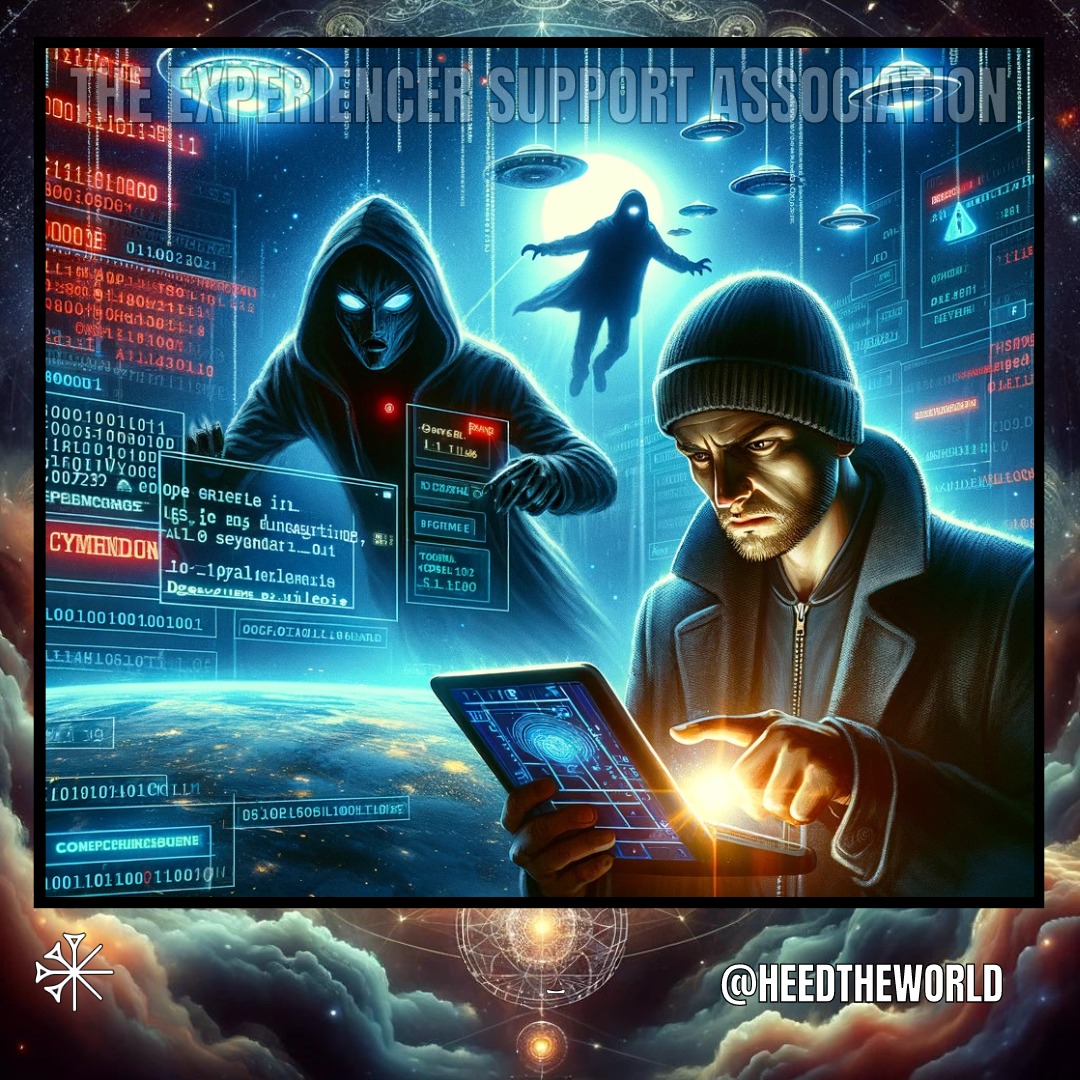MUFON Under Siege Part 2: Strengthening the Shield in MUFON’s Quest for Truth

In the sequel to our exploration of MUFON’s cybersecurity crisis, we delve deeper into the aftermath of the cyberattack on its Case Management System, as previously detailed. Beyond mere data compromise, this breach has fundamentally challenged the UFOlogy community’s trust and raised pivotal questions about data privacy and organizational accountability. It serves as a stark reminder of the delicate balance between the pursuit of the unknown and the imperative to protect sensitive information, urging a reevaluation of how such entities navigate the digital frontier.
Unfolding the Breech
On February 7, 2024, Phil Leech‘s alarming discovery of a cyberattack on MUFON‘s critical Case Management System marked a turning point. He immediately alerted Steve Hudgeons, the organization’s Director of Investigations. Their conversation unveiled the attack’s comprehensive nature, with the system’s incapacitation preventing access to over 160,000 case reports, including sensitive witness information. Leech’s proactive measures underscored the incident’s severity, instigating an urgent assessment of cybersecurity protocols and initiating damage control procedures. This event highlighted the vulnerability of critical data in the digital age and the imperative need for robust security strategies to safeguard against such breaches. You can read Leech’s entire statement here.
On February 8, 2024, Dave Scott used Twitter/X to express concerns about MUFON’s CMS, emphasizing the uncertainty regarding the system’s accessibility and the security of over 130,000 UFO sighting reports. This tweet highlighted the breach’s scale and potential impact on data integrity and trust within the UFOlogy community, signalling the urgency of resolving access issues and safeguarding sensitive information against future threats.

On February 9, 2024, Dave Scott provided an update via Twitter/X about the ongoing investigation into MUFON’s cyberattack. His tweet conveyed a crucial development: no evidence of compromised data. This update offered hope amidst the cybersecurity concerns, suggesting that, despite the breach, personal and sensitive data within the CMS remain secure. This news likely relieved the community and stakeholders concerned about the potential exposure of confidential information.

On February 10, 2024, the community’s reactions to MUFON’s data breach varied widely. I commented on Facebook, expressing sympathy for those affected and offering support to help address the incident. Bob Spearing‘s response to my comment promised transparency in dealing with the breach’s aftermath. These interactions underscored a collective desire for openness and a thorough resolution to the challenges posed by the cybersecurity incident.

Deeply troubled by the breach’s ramifications, Phil Leech voiced his concerns about witness confidentiality and the operational chaos. He emphasized the critical need to safeguard sensitive information, stating, “My own concern was more than warranted as my own information, casework, witness information, and other data was now in the hands of an unknown actor.“
Steve Hudgeons illuminated the technical aspects of the breach, offering insights into the backup system and MUFON’s cautious approach to involving law enforcement. Leech revealed, “During my conversations with Mr. Hudgeons, he informed me of specific information such as the IP address associated with the cyber-attack along with exactly how it has shut down MUFON’s ability to function as an investigative body at the moment.“
Dave MacDonald, MUFON’s Executive Director, addressed the community through social media, providing reassurance regarding the breach. He stated, “MUFON was the victim of a hack within their CMS database, which caused a disruption in the reporting capabilities of the system, causing it to become temporarily unavailable to MUFON members. As of 3 PM EST on Friday, February 9, 2024, there have been no reports of any compromised data. The requisite state and federal authorities have been contacted and are investigating accordingly”.” This statement updated the community on the situation’s status and underscored MUFON’s proactive approach to engaging with relevant authorities to address the breach.

Assessing the Impact of MUFON’s Cyberattack
Expanding the analysis to incorporate Information Security expert Jon Majerowski‘s insights sheds light on the broader implications of MUFON’s cyberattack. Majerowski’s TwitterX post, dated February 8, 2024, highlighted potential cybersecurity hallmarks of the breach and speculated on the consequences if personally identifiable information (PII) were compromised. This perspective underscores the severity of the incident and the risks associated with data breaches, especially within the context of privacy laws like General Data Protection Regulations (GDPR).
Moreover, Majerowski’s analysis prompts consideration of the legal implications MUFON may face if PII, such as names, addresses, and contact information, were exfiltrated. Under privacy laws like GDPR, organizations must protect individuals’ data and can face significant penalties for non-compliance. If MUFON’s handling of sensitive information is inadequate, it could lead to legal repercussions and tarnish the organization’s reputation.
Furthermore, Majerowski’s speculation about the potential release of invasive background checks adds another layer of complexity to the situation. If such information were to be made public, it could severely undermine public trust in MUFON. The breach jeopardizes data security and threatens the integrity of MUFON’s investigations and the confidence of experiencers who rely on the organization for support and validation.
This insight highlights the delicate balance between operational transparency and safeguarding sensitive data. While transparency is essential for maintaining trust and accountability, it must be balanced with the responsibility to protect individuals’ privacy and confidentiality. Moving forward, MUFON must prioritize robust cybersecurity measures and ethical data handling practices to mitigate the risks posed by future breaches and uphold its commitment to transparency and data protection.
Lessons Learned and Paths Forward
In conclusion, the recent cyberattack on MUFON’s Case Management System underscores the urgent need to implement robust cybersecurity measures and ethical data handling practices within organizations like UFOlogy. This incident is a stark reminder of the vulnerabilities inherent in handling sensitive information and the critical importance of safeguarding against digital threats.
MUFON and similar organizations must prioritize cybersecurity as a fundamental aspect of their operations. This entails investing in advanced security protocols, regularly updating systems, and conducting thorough risk assessments to mitigate potential vulnerabilities. Moreover, ethical data handling practices must be upheld to ensure the confidentiality and privacy of individuals who share their experiences with these organizations.
Rebuilding trust with the experiencer community is paramount in the aftermath of such incidents. Transparency, accountability, and open communication are essential in fostering trust and maintaining credibility. A collaborative approach involving active engagement with the community, transparent reporting of incidents, and clear communication of remedial actions will be crucial in regaining trust and confidence.
An email has been sent to Dave MacDonald requesting a pivotal step towards fostering open dialogue and seeking resolution. TESA is committed to supporting MUFON and working towards shared goals by initiating communication and offering collaboration. This outreach facilitates transparency and accountability and promotes cooperation and mutual respect within the UFOlogy community.
In summary, the cyberattack on MUFON serves as a wake-up call for the entire UFOlogy research community. By prioritizing cybersecurity, adhering to ethical data handling practices, and fostering collaborative relationships, organizations like MUFON can navigate through challenges, rebuild trust, and safeguard the future of UFOlogy research for generations to come.

Ryan Stacey
Heed The World
- Cybersecurity, Digital Threats, Investigations, Politics, Public Perception and Media, Science, Ufology, United States of America, World
- Bob Spearing, Dave MacDonald, Dave Scott, General Data Protection Regulation (GDPR), Health Insurance Portability and Accountability Act (HIPAA), Jon Majerowski, MUFON, Personally Identifiable Information (PII), Phillip Leech, Steve Hudgeons, The Experiencer Support Association (TESA), Ufology
-
 Ryan Stacey
Ryan Stacey


